What's New
Displaying results 4631 - 4640 of 4914
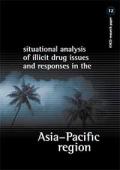
Resource | Publications,
In October 2003 the Prime Minister announced that the Australian National Council on Drugs (ANCD) had been asked to increase Australia’s involvement throughout the Asia–Pacific region, specifically to promote the prevention and reduction of drug use, and treatment for those with drug problems.
The body of this report provides a brief summary of the current illicit drug use situation, country responses to illicit drug issues, and Australian and international involvement in relation to illicit drugs for each country. More detailed analysis about each country, complete with referencing, is contained in Appendix A; and Australian and international project information, available at the time of the research, is outlined in Appendix B. The executive summary gives a broad overview of these data with findings for Asia and the Pacific presented separately.
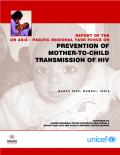
Resource | Publications,
The fifth meeting of the UN Asia-Pacific Regional Task Force on Prevention of Mother-to-Child Transmission of HIV met from 8th to 11th March 2005 in Mumbai, India.
Delegations from 15 countries, made up of government, non-government and UN agency staff, along with regional and headquarters technical staff from UNICEF, UNFPA, WHO and WFP participated in the meeting. The 15 countries represented were: Afghanistan, Bangladesh, Cambodia, China, Fiji, India, Indonesia, Lao PDR, Maldives, Myanmar, Nepal, Pakistan, Papua New Guinea, Thailand and Vietnam.
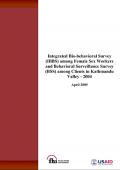
Resource | Publications,
This study was conducted among 200 street and 300 establishment-based female sex workers (FSWs) and their clients in the Kathmandu Valley.
This was the first round of the integrated bio-behavioral survey (IBBS) conducted among female sex workers and their clients in conjunction with the Behavioral Surveillance Survey in the Kathmandu Valley. The survey was carried out during the months of March and April 2004.
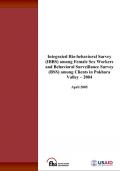
Resource | Publications,
This study was conducted among 200 female sex workers (FSWs) and 400 clients in the Pokhara Valley.
This was the first round of the integrated bio-behavioral survey (IBBS) conducted among female sex workers in Pokhara valley and behavioral surveillance survey among the clients of the female sex workers in the Pokhara valley. The survey was carried out during the months of May and June 2004.
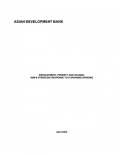
Resource | Publications,
HIV/AIDS is a human tragedy and a real and growing threat to Asia's economic prosperity. It is a fundamental development issue that the Asian Development Bank, as a broad-based development institution focused on poverty alleviation, must address.
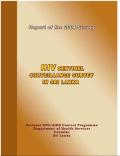
Resource | Publications,
The surveillance of Human Immunodeficiency Virus (HIV) infection is of great value in designing, implementing and monitoring of public health programmes for the prevention and control of HIV infection and the Acquired Immunodeficiency Syndrome (AIDS).
The National STD/AIDS Control Programme (NSACP) of Sri Lanka has been annually conducting HIV Sentinel sero-surveillance since 1993. This survey was initially designed on the guidelines prepared by the World Health Organization (WHO) in 1989. The purpose of HIV sentinel survey is to track HIV infection levels through ‘watch post’ institutions.
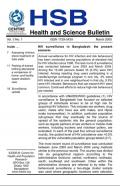
Resource | Publications,
Annual surveillance for HIV infection and risk behaviours has been conducted among populations at elevated risk for HIV infection since 1998. The last round of surveillance was conducted between June 2003 and March 2004. Among the 10,445 persons tested 35 (0.3%) were HIV infected. Among injecting drug users participating in a needle/syringe exchange program in one city, 4% were HIV infected and in one neighbourhood in that city, 8.9% were HIV infected. Behaviours that can transmit HIV were common. Continued efforts to reduce high-risk behaviours are needed.
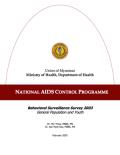
Resource | Publications,
A survey was undertaken during September–November 2003 to assess the knowledge, attitudes, and behaviours of the general population and the youth with regards to HIV/AIDS transmission and prevention at seven sites in Myanmar. A total of 9678 individuals (4631 males and 5047 females) were interviewed. Of these, 35% were youth aged 15–24 years.
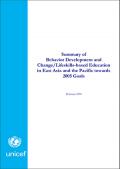
Resource | Publications,
Lifeskills-based education (LSBE) for HIV/AIDS and drug and substance use prevention in East Asia and the Pacific has been assessed by two methods. The first method of analysis was employed to compare LSBE programming in each country against the essential elements of behavior development and change (BDC) interventions. This method allows us to examine the evidence-base, appropriateness, quality, and sustainability of LSBE programming. The majority of countries are working to strengthen or expand elements of BDC that are in place or introduce new elements into their respective BDC/Lifeskills programs.
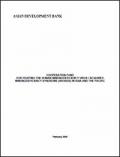
Resource | Publications,
In Asia and the Pacific at the end of 2004, the Joint United Nations Programme on HIV/AIDS (UNAIDS) estimates that 8.2 million people were living with HIV and the associated disease condition of AIDS, including 2.3 million women. This increased from 7.2 million in 2002 (women, 1.9 million). UNAIDS estimates that in 2004, 1.2 million people in the region became infected with HIV and 540,000 adults and children died from AIDS. The rapid increase of infections among women is particularly marked. In Cambodia, Myanmar, Papua New Guinea, Thailand, and several states of India the epidemic is firmly established in the general population. In other countries (e.g., People's Republic of China, Indonesia, and Viet Nam), low overall population prevalence rates disguise high, and rapidly growing, infection rates in specific population groups.
In 2002, Dr. Peter Piot, the Executive Director of UNAIDS, stated: "The epidemic in Asia threatens to become the largest in the world. With more than half the world's population, the region must treat AIDS as an issue of regional urgency. The question is no longer whether Asia and the Pacific will have a major epidemic, but rather how massive it will be." The goal for the Asian Development Bank (ADB) is to be an effective partner to its developing member countries (DMCs) in addressing this challenge.





